
In what was an entertaining game of football, Germany and Switzerland played out a six-goal thriller at the RheinEnergieStadion on Tuesday. It was arguably the best fixture from the UEFA Nations League in October as the Germans came back twice from losing positions to bag a point, denying Switzerland their first win on German soil in over 10 years.
Outrageous defending, tailor-made finishes, change in tactics and goals galore summed up a rather exciting game, something we haven't witnessed during international breaks.
After a rocky start for Germany, the Swiss fully capitalised on the home side's defensive lapses, scoring two in under 30 minutes. The game developed into a close-cut face-off between the two sides desperate for the three points.
Vladimir Petković's men had a two-goal advantage within 26 minutes, courtesy of abysmal defending from Germany and clinical finishing from the Swiss internationals in the first half.
Mario Gavranović and Remo Freuler scored from a header and a chip respectively to give an important advantage for the away side, only for Timo Werner to grab one for his side with a genius solo effort just before half time.
The goal shifted the balance of the game as the Germans started imposing themselves more on Switzerland's deep block and tried to disrupt the rigid midfield and defensive lines of the Swiss.
However, the equaliser for Germany came in the second half as Kai Havertz pressed Fabian Schär, intercepted a pass from him, ran at Switzerland's defence and dispatched the ball into the bottom corner in what was a classy goal by the Chelsea midfielder.
Germany was lacking in various aspects in the game and eventually highlighted their shortcomings yet again when they conceded a shabby goal just seconds after Havertz's beautiful solo effort. However, the game was not done just yet as Serge Gnabry got his team back into the game after hunting down Timo Werner's low cross and flicking it into the far corner with immense ease.
On that note, let us take a look at five talking points from the thrilling game.
#5 Tremendous positional fluidity amongst Timo Werner, Serge Gnabry and Kai Havertz

Although Joachim Löw deployed a 4-2-3-1 with Timo Werner as the lone centre-forward, he was far from being alone in the game. The wingers pushed inside to crowd the area ahead of Switzerland's three-man defence, almost playing as inside forwards, to get in behind their midfield. Meanwhile, Robin Gosens and Lukas Klostermann, Germany's two full-backs, provided width on either flank.
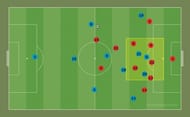
Joshua Kimmich was predominantly the number 6 for the Germans as Leon Goretzka operated a few yards ahead of him in a creative role. What was interesting to see is how well the likes of Serge Gnabry and Kai Havertz interchanged their positions depending on the ball, while Werner was always on his toes to get in behind the line or draw Switzerland's centre-backs out of the firing line for his compatriots.
#4 Switzerland's solid plan against Germany: Exploit the spaces behind

When Switzerland hosted Germany just a month ago, Petković had a different plan to counter Löw's men. In what was a 1-1 draw back in September, Switzerland took the game to the Germans and despite coming out as the more dominant side, they only snatched a point from the game.
Last night, the ideas were different but the result was the same. This time, the away side were happy to soak up pressure and hit Germany's high defensive line on the counter; a tactic which seemed to work perfectly.
Whether this was the game plan or whether they planned to sit back after a surprising early goal is unknown but either way, it was Germany who had a massive 63% of the possession throughout the game, while registering as much as 70% in the first half.
Despite Germany seeing more of the ball, Switzerland were peppering the home side on counter-attacks as Xherdan Shaqiri acted as the number 10 to get into pockets behind Germany's midfield and play the likes of Steven Zuber and Gavranovic in acres of space left behind by Gosens and Klostermann. This tactic worked incredibly well but it was Switzerland's defence who let down the Red army, quite opposite to what we saw in the reverse fixture.
Germany had 18 shots attempted compared to Switzerland's 13 but if there is a team who should be upset about today's result, it should be Switzerland because of the number of chances they squandered in front of the goal. They had the better chances but an inefficient display means they have to share the spoils with a team who were not as good as them on the night.
#3 Change in Joachim Löw's system
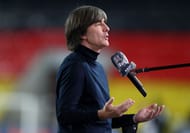
Germany drew two of their last three games in the UEFA Nations League before coming into the home fixture against Switzerland. Although a change in formation or manager was expected by avid Germany followers, not many predicted Löw to make the switch so early.
The 60-year-old played a 4-2-3-1 which switched to a 2-3-5 in possession on Tuesday night, changing from his usual 3-4-1-2/3-4-3. Although the change cost Germany in the early minutes, the home side grew into it as the game went by, and they seem rather ready to continue a 4-man defence come next break.
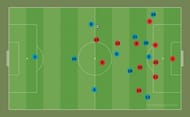
Toni Kroos' 100th appearance saw him play a different role than normal as he often dropped in the space left by Gosens to play as an auxiliary left-back, solely to help in ball progression in the first phase of the build-up play.
Kroos did the job excellently due to his vision to find passes in between the lines and his ability to use both his feet effectively while being pressed. However, when Kroos joined Kimmich in midfield once the ball bypassed Switzerland's midfield, Chelsea outcast Antonio Rüdiger was often exposed at the back due to Matthias Ginter leaving his position frequently and Germany's full-backs almost operating as the wingers for the team.
Luckily for Germany, Switzerland, despite scoring 3 goals, were misfiring on numerous occasions. The Germans looked incredibly vulnerable on the break and every time Shaqiri had the ball, it was either a 2v2 or a 3v3 against Germany's backline, eventually leading to goalscoring chances for the away side.
The 4-man defence is promising if Joachim Löw plans to keep his job as Germany's head coach. However, with the quality of players he has at his disposal, the World Cup winner should be doing much better.
#2 Individual brilliance saves the day for Germany; lack of aerial presence evident

When a team is up against a deep block as efficient as Switzerland's, your full-backs and wingers wish to have an aerial presence in the team who can get his head onto crosses in the box. The lack of a strong centre-forward who can bully and drag his markers is being missed in this Germany XI.
While moments of magic from the Chelsea boys, Havertz and Werner, probably saved their manager's future at the helm, worries are evident and Löw has a few more weeks to come up with a solution before the squad returns for another international break by the end of November.
The Germans look petrified whenever they are caught on the counter-attack while they seem to lack ideas to break down a strong defence. Germany is blessed with technically world-class players all across the pitch but the manager is slowly starting to have less impact on what his players are producing on the pitch.
With the Euros 2021 coming very soon, Joachim Löw would have to show his players and his fans that he is the right man to lead the country into another international competition. By the looks of it, Germany seem to require new, exciting and effective ideas, something Löw currently doesn't provide.
#1 Granit Xhaka and Xherdan Shaqiri: Wealth of experience comes handy for Switzerland

Despite Switzerland seeing only 37% of the ball on Tuesday night, Granit Xhaka and Xherdan Shaqiri ended the game with 70 and 46 touches respectively. They were at the centre of things for Petković's men in almost every move.
A left-winger on paper, Shaqiri was given the freedom to bomb across the pitch and act as the number 10 for Switzerland, operating in and around Kimmich and exploiting the spaces left by Germany's midfielders.
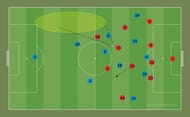
He did the job he was asked to do with precision. The 29-year-old completed 24 passes, 4 duels, 2 dribbles and 2 key passes to finish the game. He held the ball off Kimmich and Rudiger as Gavranovic, Zuber and Freuler ran down the channels.
Shaqiri's strength and trickery did cause mayhem in the middle of the park; the number of turnovers and quality chances the away side created speaks for itself.
On the other hand, Granit Xhaka's interception for the second goal is everything you need to know about the captain's performance. A smart reader of the game, Xhaka not only initiated counter-attacks but also committed himself forward to create numerical overloads on the left flank.
The 28-year-old was equally important in his own half as he did the dirty work and helped Switzerland in playing out from the back against Germany's rather weak and ineffective press.
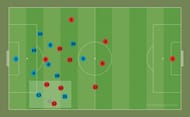
A thrilling game eventually came to an end as both the teams took home one point. Germany would be the happier side given the amount of clear-cut chances they conceded on the other side of the pitch but considering the balance of both halves, they probably deserved something from the game.
